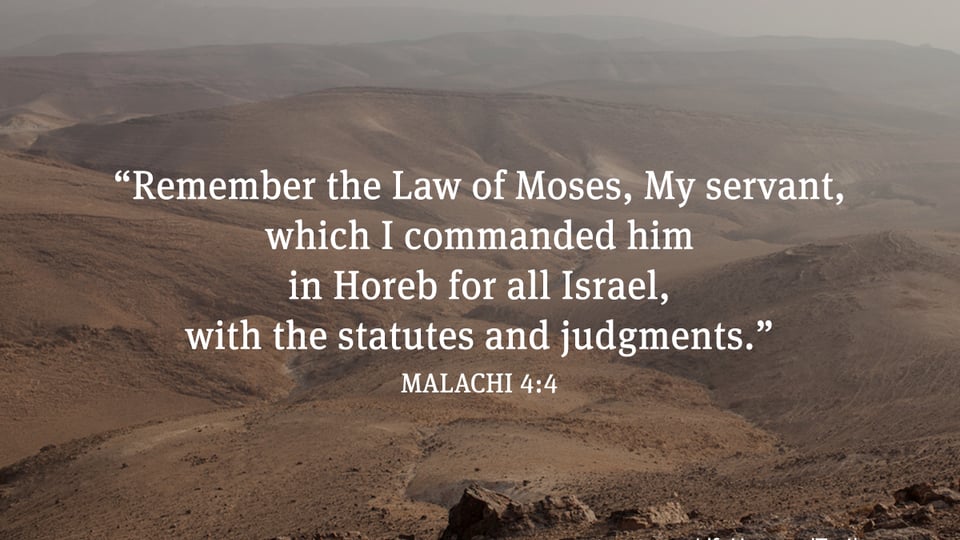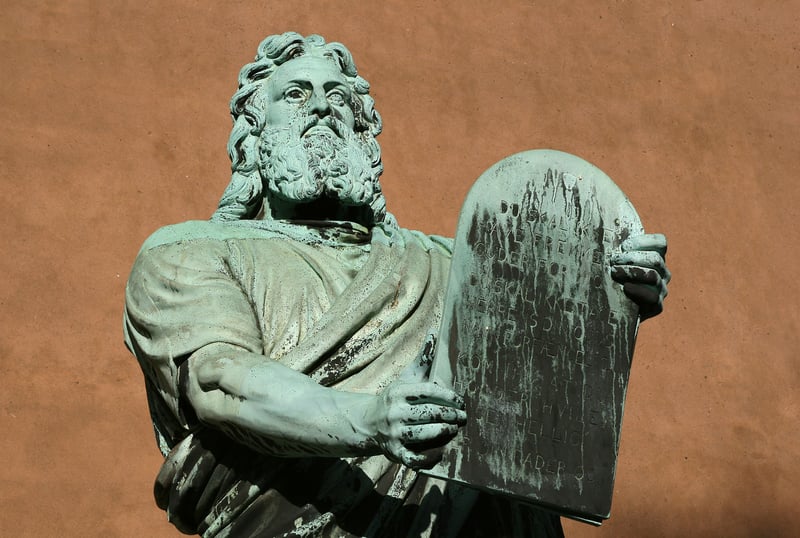The Law of Moses is quoted by Jesus, Paul and others in the New Testament. What is the Law of Moses and how do the various laws apply to Christians today?

“Remember the Law of Moses, My servant, which I commanded him in Horeb for all Israel, with the statutes and judgments” (Malachi 4:4).
Do Old Testament laws still apply?
“The Law of Moses is abolished!” “The Law of Moses is done away!” “We’re Christians; we aren’t followers of Moses!” These are some of the statements made by Christian commentators about that huge portion of the Old Testament known as the Law of Moses.
Others will tell you that Moses was the great lawgiver of Israel and that those laws guide us in righteous living. There is so much to learn from Moses, some will say.
So, which is it? What exactly is the Law of Moses? And maybe more importantly, how should 21st-century Christians (and all those interested in what the Bible has to say about right living) regard the Law of Moses?
This article seeks to help those searching for biblical principles to answer the question, What Old Testament laws still apply?
What is the Law of Moses?
Let’s begin with a definition of the Law of Moses.
The Law of Moses is the body of law that God gave to ancient Israel through Moses as mediator. The Law of Moses is found in the Old Testament books of Exodus, Leviticus, Numbers and Deuteronomy. You can usually identify these laws because they are often introduced with this kind of wording: “Then the LORD spoke to Moses, saying . . .” (Exodus 25:1). According to Jewish tradition, there are 613 such laws.
But to be exact, we need to exclude the 10 Commandments, since they were given directly by God to the people (Exodus 20:1, 19).
Are the 10 Commandments part of the Law of Moses?
So here is an important distinction: The 10 Commandments (also called the Decalogue) were given directly by God. They were not mediated by Moses. They are the 10 points of fundamental moral law given directly by God to His people.
The 10 Commandments define how to love God and how to love others (Romans 13:9; Matthew 22:37-40). This moral law existed from the beginning (see “Were the 10 Commandments Around Before Moses?”). God’s 10 Commandments are expounded throughout the Bible in the letter and in their spiritual intent. They provide a framework upon which all of the law of God hangs.
The 10 Commandments are quoted repeatedly in the New Testament (see “Are the 10 Commandments Upheld in the New Testament?”).
But, then, so are many of the laws of Moses.
Paul and the Law of Moses
The Law of Moses is repeatedly quoted in the New Testament, including dozens of references in Paul’s letters. What’s more, the apostle Paul tells us rather clearly that we are to be instructed and edified by all of the Scriptures, including the laws of Moses.
“All Scripture is given by inspiration of God, and is profitable for doctrine, for reproof, for correction, for instruction in righteousness” (2 Timothy 3:16).
When Paul wrote that, the phrase all Scripture referred primarily to what we call the Old Testament, much of which came from God through Moses.
Jesus and the Law of Moses
Jesus Christ the Savior acknowledged the Law of Moses as He was engaged in His titanic battle with Satan, the adversary of God.
Jesus Christ the Savior acknowledged the Law of Moses as He was engaged in His titanic battle with Satan, the adversary of God. The battle is known as the temptation of Jesus, and it is recorded in Matthew 4:1-11 and in Luke 4:1-13.
Now notice something very interesting. The devil attempted to turn Jesus from His mission three times!
First, Satan tried to entice Jesus to transform some stones into bread (Matthew 4:3; Luke 4:3). Jesus had fasted for 40 days and nights, so this was a powerful temptation.
The Savior’s reply comes straight from the Law of Moses: “Man shall not live by bread alone, but by every word that proceeds from the mouth of God.” This is quoted from Deuteronomy 8:3, part of the Law of Moses.
The adversary didn’t give up easily. Next, he asked Jesus to prove Himself as the Son of God by throwing Himself off the pinnacle of the temple, trusting in God to save Him (Matthew 4:6; Luke 4:9). Jesus’ reply was again a quote from the Law of Moses: “It is written again, ‘You shall not tempt the LORD your God’” (Matthew 4:7, quoting directly from Deuteronomy 6:16).
The third attempt was Satan’s demand that Christ worship him in exchange for control over all the kingdoms of the world then (Matthew 4:9). Again, the resolute reply from Jesus, “You shall worship the LORD your God, and Him only you shall serve” comes from the words uttered by Moses in Deuteronomy 6:13.
Jesus acknowledged and honored the Law of Moses.
Read more about Jesus and the Law of Moses in Matthew 5:17-20 and in our article “Jesus and the Law.”
Types of laws in the Old Testament
But that still leaves us with a big question: What else does the Law of Moses contain? What types of laws are there? Do those laws speak to us in this 21st century? And if so, what do they say?
In principle the Law of Moses is a huge body of laws designed to cover every aspect of life for a physical nation. They include civil laws for ancient Israel, as well as ceremonial laws—various animal sacrifices, washings and priestly ceremonies.
They also include laws governing marriage and family, societal concerns such as care for widows and orphans, animal control laws, property rights, tithing laws, laws of the land Sabbath and the jubilee, laws against apostasy, and laws concerning the holy days and the festivals.
Biblical judgments
Before we take a look at some examples, we need to note something very important. Ancient Israel had a divinely appointed body of judges, whose responsibility it was to judge many of the legal matters that arose in the nation.
Moses’ father-in-law, Jethro the Midianite, wisely advised his son-in-law to appoint judges (Exodus 18:13-26).
God guided Moses to appoint “able men, such as fear God, men of truth, hating covetousness” (verse 21) as administrators for the law. Those judges were given the prerogative of enforcing the Law of Moses, with its penalties such as fines and capital punishment. That was a responsibility of the national government, one that reflected God’s desire to see justice administered throughout the land. (For related reading, see our blog post “Civil Laws Now Administered Differently.”)
Examples from the Book of the Law
So now let’s turn our attention to some of the laws of Moses and their modern-day applications. Several of these examples are drawn from Exodus 21 through 24, often called “the Book of the Law.” These chapters constitute the heart of the covenant God made with Israel at Mount Sinai.
Consequences of dishonoring parents

Exodus 21:17 instructs the judges of Israel to put to death any who curse father or mother. This law connects directly with the Fifth Commandment, which commands us to honor our parents (Exodus 20:12).
Even though the penalty historically was reserved to be enacted by the national judges of Israel, the principle is a Christian principle (see Ephesians 6:2-3): Honor (respect) your father and your mother. Don’t you dare abuse them, for if you do so, you commit a very serious crime in God’s sight!
What does the Bible say about borrowing things?
Exodus 22:14-15 exacts a monetary penalty against anyone who borrows something from another member of the community that then becomes damaged or killed.
The principle is still important today and is clearly applicable to modern Christian ethics. We can see the application: Be careful with property that belongs to others. Borrowed items should be returned to their owners in good condition.
As individuals, we cannot enforce the monetary penalty that applied to the nation of Israel, but we can apply the principle to ourselves and be very careful with property that belongs to others. If it is damaged while we are using it, we should make it right by reimbursing the owner or replacing the item.
Widows, orphans and strangers
Exodus 22:21-24 enjoins care and concern for three categories of people who were part of the Israelite community: foreigners, widows and orphans. These three groups would have been the most vulnerable in that ancient society. Watch out for them, God says! Care for them!
Caring for those who are vulnerable is an essential element of genuine Christianity.
The principle is godly and is echoed in the New Testament, where James 1:27 provides a description of pure and undefiled religion. “Pure and undefiled religion before God and the Father is this: to visit orphans and widows in their trouble, and to keep oneself unspotted from the world.”
Caring for those who are vulnerable is an essential element of genuine Christianity.
Importance of mercy
Exodus 22:26-27 is an interesting example of an ancient law with a modern application. “If you ever take your neighbor’s garment as a pledge, you shall return it to him before the sun goes down. For that is his only covering, it is his garment for his skin. What will he sleep in? And it will be that when he cries to Me, I will hear, for I am gracious.”
This law tells us not to be ruthless in our business dealings when we are owed money by someone who genuinely wants to repay but can’t.
Let’s consider a possible modern application. Someone, a colleague or family member, owes us money, but is unable though not unwilling to repay the debt. Perhaps he owns a pickup truck, which he relies on to do work so he can feed his family. He pleads with you: “Please, please, don’t take my truck. I have to have it, or I can’t work and provide for my family.”
The principle? The truck may be owed to you, but don’t grab it. He depends on it for his livelihood. Show a little mercy and allow him time to repay.
What does the Bible say about respecting leaders?
Exodus 22:28 provides another interesting example. “You shall not revile God, nor curse a ruler of your people.”
In today’s culture in which respect for God and national and religious leaders has been eroded, this law provides another example of one that shows us the way to walk. It even guided the apostle Paul, who in Acts 23:5 gave an apology to the high priest of Israel for reviling him and quoted this law.
Animal control laws
Some of the laws of Moses will seem archaic to us, perhaps with no obvious modern-day application.
For example, Exodus 21:28-36 is an ancient animal control law concerning oxen that may roam and gore or even kill members of the community. There were fines imposed for allowing that to take place, and the infringement could even rise to the level of a capital crime under certain circumstances.
Most of us don’t own oxen. But we do own motorized vehicles that have the same potential to kill or maim that oxen had back in Moses’ time. So the lesson for us is to keep our vehicles (or our industrial machinery if we own a factory) in good working order and to drive with care to avoid endangering life and limb of others.
For example, if we know our brakes or tires are worn out, we have the responsibility to replace them because the consequence of our negligence could be catastrophic to ourselves and others.
So this ancient law does have modern application after all.
Do not muzzle the ox
Speaking of oxen, the apostle Paul used an ancient Mosaic law to provide the rationale for ministers of the gospel to live off the gospel in New Testament times. The law reads, “You shall not muzzle an ox while it treads out the grain” (Deuteronomy 25:4).
Paul quoted that very same law in 1 Timothy 5:18 and 1 Corinthians 9:9 to point out the fact that ministers of the gospel have the right to be paid. “Is it oxen God is concerned about?” Paul asks. It surely is, though Paul was convinced it was even more “for our sakes” (verse 10). Laws of Moses have practical applications centuries after they were first given.
Learning from the laws of sacrifice
It is true that some of the laws of Moses don’t have a direct application for individual Christians today. Since there is no functioning Levitical priesthood among Christians today, the laws of sacrifice (Leviticus chapters 1 to 7) don’t speak to us directly.
But even these laws teach us something: the animal sacrifices were to be unblemished, perfect (Leviticus 22:18-24). This teaches us that Jesus Christ was spiritually “a lamb without blemish and without spot” (1 Peter 1:19). The laws requiring the Levitical priests to be healthy and pure (Leviticus 21) also teach us that God requires the best from those who worship Him.
Learn more in our article “Types of Sacrifice in the Bible and What They Mean.”
Civil laws in the Bible
Of course, many of the laws of Moses simply can’t be fully applied on an individual level today, since they require action at the governmental level. For example, the law of the jubilee (Leviticus 25:8-17) required a release of all debts in the 50th year and the return of lands to their original owners. Neither churches nor individuals can enact such a law today.
But we can see the wisdom of God in this law. Had it been enacted in any nation or in the world, it would have prevented the build-up of economic stresses within communities and among nations. World wars have begun as a result of such economic imbalances! It would also prevent generational poverty within families.
God’s laws are always wise and designed for the benefit of humankind.
Murder vs. manslaughter
More than one principle of good jurisprudence from Moses have found their way into our modern civil law codes.
The Law of Moses provides us with the two great commandments.
For example, the distinction between murder and manslaughter, so critical in determining the seriousness of different classifications of homicide, continues on in the laws of the United States and of other nations.
Murder is deliberate, intentional. Manslaughter results in loss of life, but it is involuntary or accidental. Exodus 21:12-14 makes the distinction.
Two great commandments
Finally let’s take note: the Law of Moses provides us with the two great commandments.
The first is to love God with all our heart, soul and mind. This is the greatest of all the commandments (Mark 12:28-30).
The second is like it: to love our neighbor as ourselves (verse 31).
Jesus quoted them, both from the Law of Moses! You can find those two great commandments in Deuteronomy 6:5 and Leviticus 19:18. Moses didn’t invent those laws, but God gave them to him to pass along to Israel then and to us today.
Learn more in our article “The Great Commandment.”
Remember the Law of Moses
The laws of Moses are not to be cast aside in this 21st century. They should all be read according to their intent and purpose for our edification and applied in our lives individually and as communities, as we are able.
The last prophet of the Old Testament left us with a practical reminder as He looked forward to our times. “Remember the Law of Moses, My servant, which I commanded him in Horeb [Sinai] for all Israel, with the statutes and judgments” (Malachi 4:4).
That was good advice in Malachi’s time—and it is still good advice today!





